
林兆華戲劇工作室
Lin Zhaohua Drama Studio
Lin Zhaohua Drama Studio



林兆華戲劇工作室
Lin Zhaohua Drama Studio
Lin Zhaohua Drama Studio

7-9.3.2008
香港演藝學院歌劇院
Lyric Theatre
Hong Kong Academy for Performing Arts
普通話演出,附中英文字幕
演出長約1小時40分鐘,不設中場休息
Performed in Putonghua with English and Chinese surtitles
Running time: approximately 1 hour and 40 minutes with no interval
原著:易卜生
Playwright: Henrik Ibsen
導演:林兆華
Director: Lin Zhaohua
為了讓大家對這次演出留下美好的印象,請切記在節目開始前關掉手錶、
To make this performance a pleasant experience for the artists and other members of the audience, PLEASE switch off your alarm watches, MOBILE PHONES and PAGERS. Eating and drinking, unauthorised photography and audio or video recording are forbidden in the auditorium. Thank you for your co-operation.
觀賞以下節目可贏取
香港至北京商務客位來回機票各兩張!
你只須在票尾背面寫上姓名、香港身份證號碼、聯絡電話及電郵地址,完場後投進 設於大堂的港龍航空抽獎箱,即可參加抽獎。抽獎結果將刊登於 2008 年 3 月 17 日 南華早報及明報。
北京京劇院
京劇丑角宗師蕭長華紀念系列
29.2-1.3.2008 (星期五至六)
晚上7:30 香港演藝學院歌劇院
林兆華戲劇工作室 建築大師
7-9.3.2008 (星期五至日)
晚上8:00 香港演藝學院歌劇院
To enter, write your name, HKID number, telephone number and email address on the back of your ticket to this performance and drop it into the Dragonair lucky draw box in the foyer. The winners will be announced in the SCMP and Ming Pao on 17 March 2008.
The Peking Opera House of Beijing
The Master of Chou: Xiao Changhua
29.2-1.3.2008 (Friday - Saturday)
7:30pm Lyric Theatre, HKAPA
Lin Zhaohua Drama Studio
The Master Builder
7-9.3.2008 (Friday - Sunday)
8:00pm Lyric Theatre, HKAPA
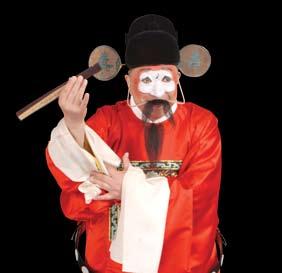
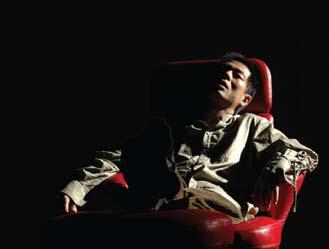
原著 易卜生 Playwright Henrik Ibsen
導演
演員 Cast
林兆華 Director Lin Zhaohua
索爾尼斯 Halvard Solness
濮存昕 Pu Cunxin
希爾達 Hilda Wangel
陶虹 Tao Hong
開雅 Kaia Fosli
劉彬燕 Liu Binyan
瑞格納 Ragnar Brovik
李浩天 Li Haotian
愛琳(索爾尼斯太太) Aline Solness
彭雯妮 Peng Wenni
賀達爾醫生 Doctor Herdal
胡健 Hu Jian
布羅維克 Knut Brovik
崔文嶔 Cui Wenqin
創作及技術人員 Creative and Technical Team
翻譯 Translator
張南 Zhang Nan
舞台設計 Stage Designer
易立明 Yi Liming
燈光設計 Lighting Designer
韓江 Han Jiang
助理導演 Assistant Director
王曉鑫 Wang Xiaoxin
音響效果 Sound Effects
鄭晨 Zheng Chen
舞台監督 Stage Supervisor
李琪 Li Qi
巡演統籌 Tour Co - ordination
周瑩盈 Zhou Yingying
崔文嶔 Cui Wenqin
製作總監 Production Director
黃紀領 Huang Jiling
英文字幕編輯
Catherine Macer
字幕操作
English Surtitles Editor
Catherine Macer
Surtitles Operator
凌濛 Ling Meng
選用音樂 Incidental Music
〈衪的手〉
選自《我們耶穌的軀體》,BuxWV 75
作曲 巴克斯泰烏德(約1637–1707)
演出 蒙特威爾第合唱團
英國巴羅克獨奏家樂團
浮雕弦樂團
指揮 約翰.艾略特.加德納
《瑪利亞之子耶穌》,SWV 471
作曲 許茨 (1585–1672)
演出 蒙特威爾第合唱團
英國巴羅克獨奏家樂團
浮雕弦樂團
指揮 約翰.艾略特.加德納
《不要放棄》
曲詞 彼得.加布里埃爾 主唱 彼得.加布里埃爾、凱蒂.布殊
港龍航空為《建築大師》成員提供航空服務
Members of The Master Builder production are flown in by
Ad Manus from Membra Jesu Nostri, BuxWV 75
composed by Dietrich Buxtehude (ca. 1637–1707) performed by The Monteverdi Choir
The English Baroque Soloists
Fretwork conducted by John Eliot Gardiner
O Bone Jesu Fili Mariae, SWV 471 composed by Heinrich Schutz (1585–1672) performed by The Monteverdi Choir
The English Baroque Soloists
Fretwork conducted by John Eliot Gardiner
Don’t Give Up written by Peter Gabriel sung by Peter Gabriel and featuring Kate Bush

《建築大師》講述了一位毀滅性的天才 —— 索 爾尼斯的故事。數十年前一場神秘的大火成就 了他成為建築大師的夢想。他運用自己的天 才,設計建造了許多令世人震驚的建築。但時 移世易,大家不再需要教堂,只需要可供安居 的住宅,這使索爾尼斯感到英雄無用武之地, 也漸漸懷疑自己的才華,同時害怕年輕人會後 來居上。功成名就的他渴望在晚年再次登上事 業的巔峰。超常的活力、不羈的魅力,吸引了 年輕女子徘徊他身邊;年邁的大師行走在道德 的邊緣,對青春無限嚮往,卻又懼怕青春的威 脅。但惹人艷羨的聲譽背後,索爾尼斯的生活 過得並不快樂。
妻子愛琳始終無法擺脫大火帶給她的創傷,家 庭中的氣氛也因她而變得沉悶壓抑。年輕女助 手開雅受大師吸引,和他關係曖昧。繪圖員瑞 格納逐漸展露建築設計的才華,令大師深感威 脅,瑞格納也因為未婚妻開雅迷戀大師而對他 懷有敵意。瑞格納的老父當年是索爾尼斯的老 闆,後來被後浪推倒,變成大師的下屬,在臨 死前只希望大師能給兒子一個出頭的機會。
一天,神秘少女希爾達突然出現,改變了一 切。十年前跟大師訂了秘密約定的希爾達,是 天使?是烈焰?是獵食的鷹?還是夢想與慾望 的化身?大師心中沉睡多年的國度被喚醒,深 藏已久的秘密被揭開,他一步一步走向生命的 巔峰……
The Master Builder looks at the life of a destructive genius Halvard Solness. As a young man, Solness is involved in a fire — an experience that ignites his ambition to become a great architect. Sped on by his vigour and passion, Solness’s talents find expression in many great architectural masterpieces and are applauded the world over.
But, as times change, the need for spiritual sanctuary is replaced by the longing for creature comforts, and the demand for the construction of grandiose cathedrals is pushed aside for the mass production of residential homes. Slowly Solness finds himself like a ‘fish out of water’. His growing doubts about his ability to compete are compounded by the fear of being eclipsed by the bright, young newcomers in his profession. He yearns to reach a new peak in his career, but it continually eludes him.
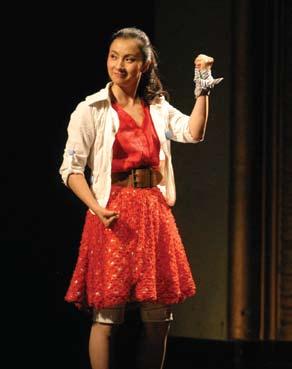
And so Solness spends the latter part of his life torn between his wistful adulation of youth and the fear of the threat that it possesses. For the aging architecht life holds little joy, and only rare moments of peace.
Solness’s electrifying creative instincts and personal charisma have always been magnets for admiring young women, and even in his advancing years he still has a way with the girls. His young female assistant Kaia is deeply attracted to him and they dance around each other on the brink of a dangerous liaison. His wife Aline, however, is little more than a gloomy spectre in the family home, having never recovered from the trauma of the fire.
Kaia’s fiancé Ragnar Brovik is an up - and - coming draughtsman whose potential is fast becoming a threat to Solness. Brovik’s father, once Solness’s boss, has lost out in the race for success. Now reduced to serve Solness as an employee, the
aging Brovik’s only hope is that Solness can give his son a head - start in his career. But the younger Brovik harbours a jealous hatred for Solness, fuelled by the infatuation Solness and Kaia share.
With the sudden arrival of Hilda, a mysterious young woman, events take a dramatic new turn. Ten years earlier Solness had made a secret pact with Hilda and now she has come to bring it to fruition. The past, it seems, is finally catching up with Solness…
So, who is Hilda ? Is she an angel of deliverance or a bird of prey ? Is she the incarnation of dreams or the instigator of improper desire? As secrets are revealed and the master builder’s inner demons are released, he allows destiny to take him to the summit (and perhaps the downfall) of his career…
游離於兩個極端之間
文:林兆華
本人 1961 年畢業於中央戲劇學院,組 織分配我到北京人民藝術劇院工作至 今。1978年才開始導演工作。在一個傳 統厚實的劇院,像我這樣的學院出來的 學生當導演,差着好幾輩兒呢,我給自
己起了個外號,叫 —— 屁簾兒導演,定 位比較恰當。就這樣,我糊裏糊塗的當 了導演,又糊裏糊塗的排了幾個有影響 的戲。
我是個沒有什麼出息,沒有什麼偉大理 想的排戲人。創立一種學派,建立一種 理論,想也不去想它,心裏永遠保持那 麼點兒天馬行空的創作情趣,那麼點兒 自由幻想的戲劇空間,我就活得樂呵呵 的,充充實實的。
有人稱我為「前衛導演」,否,我游離 於兩個極端之間,「在動作與不動作之
間找到了一種完全的均衡……在懶惰中 用功,在用功中偷懶,其實就是一個半 有名半無名的人……」
子思所倡導的中庸精神,太像我的自畫 像了。
by Lin Zhaohua
I graduated from The Central Academy of Drama in 1961, and was sent to the Beijing People’s Art Theatre where I have worked ever since. I started working as a director in 1978. But in a theatre with strong traditions, a fresh graduate from the Academy is too young, both in age and experience, to be a director. So I gave myself a nickname — ‘Director in Toddler’s Diapers’ — to give myself better positioning. And so I became a director in a whirl of bewilderment, and produced a few influential plays in a whirl of bewilderment!
I’m actually a director without prospects or ambition. It doesn’t matter to me if I have created a new school of directing or built up a new theory; I don’t really think about these things. As long as I can keep the joy of creating a few wild fantasies, have the theatrical space, and a little bit of free imagination within my heart, I can live happily and fulfilled. Some people call me an ‘avant - garde director’, but that’s not true. I travel between the two extremities — finding complete balance between moving and not moving; between working hard and being lazy — in fact I am a half famous, half anonymous person!
The Golden Mean (from the Doctrine of the Mean, which describes the ‘way’ of attaining perfect virtue) proposed by Zisi, grandson of Confucius, bears close resemblance to my self - portrait.
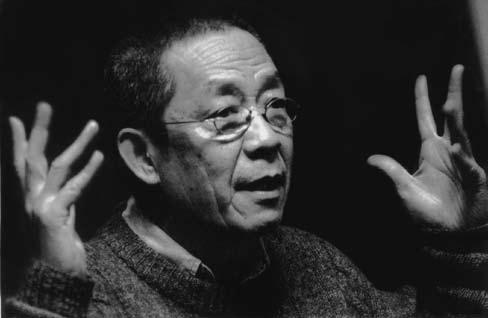
林兆華
一代導演林兆華
文:過士行
有位外國作家這樣說:「一個時代怪異 奇特的作品常常就是另外一個時代的傑 作。一種獨特風格被人理解和欣賞,一 個獨創的思想被人理解和尊重,都需要 漫長的時間。大多數人寧願選擇簡單和 平庸。只有未來將尊重這些獨創的大膽 風格。」
林兆華的命運正是這樣。這位從未終止 過探索的話劇導演,因一生不甘平庸而 受到同時代人的輕慢,假如我們之中有 人能再活 50 年的話,一定會看到他的創 作已經成為我們的寶貴財富,那時人們 也許會替今天感到歉疚,我們對這位藝 術家是多麼的苛刻啊!
過士行 是中國國家話劇院一級編劇,與林兆 華戲劇工作室合作無間。
by Guo Shixing
A foreign writer once said: “A weird and peculiar work in one era is usually a masterpiece in another. And a very long passage of time is required for a unique style to be understood and admired by others, or for an original idea to be understood and respected by others. Most people prefer simplicity and mediocrity; and only the future will respect these original and bold styles.”
The destiny of Lin Zhaohua is exactly the same. As a theatre director he has never stopped exploring, nor settled for mediocrity in his work. Because of this, he has often been slighted by others of his generation. But if any of us could live for another 50 years, we would surely see Lin Zhaohua’s creations hailed as treasures, and people feeling apologetic for the harshness with which we have treated this great artist.
Guo Shixing is a ‘First Rank’ playwright of the National Theatre Company of China and works closely with the Lin Zhaohua Drama Studio.
《建築大師》是易卜生 64 歲時完成的作 品。從手稿中反常的大量小錯誤和省略 來看,他恐怕是以極快的速度完成這部 作品。《建築大師》的出版在歐洲備受 期待。1892年冬天,劇本一出版,立刻 激起了社會各界的爭論;倫敦的首演幾 乎令保守的評論界嘩然。報紙評論道: 「超級精神失常。」— 《晚間新聞》
「情慾……不敬……骯髒……根本就 是褻瀆。」 —《早報》
《建築大師》被認為是易卜生最具爭議 性的作品,它讓各國的讀者和觀眾都無 比困惑。在易卜生的作品中,索爾尼斯 這個人物可說是他頭一次嘗試自畫像。
易卜生一直把自己看作是一個建造者, 並把自己的戲劇比作建築作品。正如索 爾尼斯一樣,易卜生一直懼怕從高處向 下或者從平地向深淵中看,這種恐懼更 隨着他的衰老而日益加重。索爾尼斯殘 忍,為了實現自己的野心而可以隨時犧 牲他身邊最親近的人的利益,他嚮往和 懼怕青春,他內心審美與道德交戰── 這一切都是易卜生本人所具有的性格。
易卜生開始創作《建築大師》之前幾個 月,挪威的青年作家作了三場關於現代 文學墮落的講座,批判了包括易卜生在 內的挪威文學四大家。讓所有人大為 吃驚的是,易卜生接受了青年作家的邀 請,出席了全部三場講座。索爾尼斯對
Henrik Ibsen wrote the The Master Builder when he was 64 years old. From the unusually large number of minor mistakes and abbreviations in the manuscript, he probably finished the script with tremendous speed. Indeed, the publication of The Master Builder was highly anticipated in Europe and when it finally appeared in the winter of 1892 it sparked enormous debate in every social circle. The opening performance in London sent the conservative audience into a frenzy, with newspaper critics writing such things as:
“…acute dementia…” — The Evening News
“Sensuality…irreverence…unwholesome…simply blasphemous” — The Morning Post
The Master Builder is seen as Ibsen’s most controversial work, with the capacity to send readers and audiences of every nation into utter confusion. Solness is widely interpreted as Ibsen’s first attempt at self - portrait. Ibsen had always seen himself as a ‘builder’, and often described his plays as ‘architectural works’. Just like Solness, Ibsen was afraid of looking down from high places, or looking into an abyss from levelled ground, and as he aged this fear grew stronger. Solness’s ruthlessness, his ability to sacrifice the well - being of those closest to him for his own ambition, his yearning for youthfulness yet his fear of being superseded by the ‘bright young things’, as well as the battles that waged in his heart between morality and aestheticism — were all character traits possessed by Ibsen.
A few months before Ibsen started work on The Master Builder a group of young Norwegian
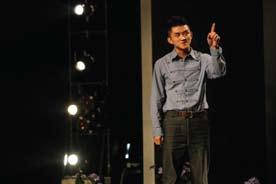
於「年輕人來敲門」的恐懼,可能來自 易卜生對青年作家的攻擊的回憶。
易卜生1906年逝世後,出版社推出了一 系列他在《建築大師》創作前兩年寫給 一個叫愛美麗.巴爾達赫的維也納女孩 的信。從這些信看來, 61 歲的易卜生似 乎對這位 18 歲的少女懷有某種感情,與 她維持了一年多的書信往來。這個少女 很容易叫人聯想到《建築大師》中的神 秘少女希爾達。有趣的是,建築大師的 妻子愛琳很明顯是以易卜生的妻子為原 型的。
有人認為《建築大師》是易卜生私生活 的曝光,也有人說劇本是大師對自己一 生的回憶、總結和評判。跟之前的現實 主義社會問題劇《玩偶之家》、《人民公 敵》等不同,《建築大師》是大師顛覆 自我的轉型之作,他開始踏上象徵主義 的道路,解剖人物靈魂深處,探索複雜 微妙的內心世界,劇情撲朔迷離,寓意 豐富,充滿神秘色彩。
如果用佛洛伊德作為指引,《建築大 師》可以詮釋為一部關於慾望與激情的 作品。中心意象的象徵意義,可以引 出種種遐思。老男少女的感情關係, 也不難讓人聯想到納玻科夫的小說《洛 麗塔》。
writers held three lectures on the corruption of contemporary literature. They invited Ibsen to attend and to everyone’s astonishment, he accepted. The lectures were deeply critical of the four great littérateurs of Norway, including Ibsen. It is perhaps Ibsen’s memories of these ‘attacks’ from the young writers that provided him with the motivation for Solness’s fear of ‘youth knocking on the door’.
After Ibsen’s death in 1906, publishers released a series of his letters to Fraulein Emilie Bardach of Vienna. The letters are dated two years prior to the creation of The Master Builder. From these communications it is evident that the aging writer had some kind of affection for the young Emilie, with whom he kept in touch for over a year. Many people see in this young woman the mysterious character Hilde Wangel, and it is widely believed that Aline Solness was modelled on Ibsen’s own wife.
Whilst some critics believe The Master Builder a revelation of Ibsen’s private life, others consider the play an amalgamation of his reminiscences, conclusions and judgements about his life. Unlike the realism of his earlier plays, that tackled social problems ( A Doll’s House and An Enemy of the People ), The Master Builder is understood to be Ibsen’s attempt at ‘tackling’ himself. It was also seen as a bid to change his writing style. With The Master Builder Ibsen used a lot more symbolism then he had done in earlier works and spent time dissecting his characters’ souls. He ventured into their complicated and delicate inner - worlds to create an intriguing plot filled with layers of meaning and underlying messages.
If one uses Freud as a benchmark, The Master Builder can be interpreted as a work about desire and passion. The symbolism of the central image can easily elicit wild and fanciful thoughts. Indeed, in the story of a love affair between an old man and
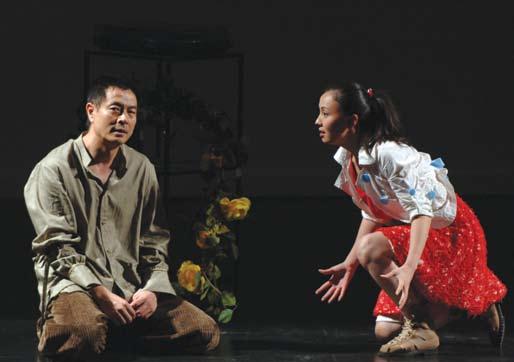
在動筆寫《建築大師》之前,易卜生 寫了一首詩來理清他的思緒,其中有這 四句:
在那廢墟下面埋藏着一件珍寶 它的光輝縱使烈焰也無法壓抑 他和她,只是虔誠地尋找 直到他或她將它找到
這件廢墟下面的珍寶是什麼?建築大師 索爾尼斯的攀登與掉落,對生活在今日 世界的你與我,有什麼關係? 答案在每個人的心裏。
a young girl, it isn’t hard to make associations with Vladimir Nabokov’s Lolita
Before writing The Master Builder Ibsen wrote a poem to clear his thoughts. It contains the following four lines:
For underneath it all lies a hidden gem, A gem that’s impervious to burning. And if they keep looking, either of them Might find it by raking and turning.*
So, what is this gem that lies beneath the rubble and embers ? The Master Builder ? Solness ? His climb and fall? And what has it to do with you and me in today’s world?
The answer is in everyone’s heart.
Unless Otherwise specified, all articles tranlated by Joan Chang
*Translated by John Northam
Reprinted with kind permission from Ibsen.net
林兆華戲劇工作室
1989 年,林兆華成立了林兆華戲劇工 作室,以不受舊體制約束的自由獨立身 份,致力創建屬於中國的當代戲劇形式 和美學,創作當代戲劇精品。工作室成 立以來,創作了許多風格前衛的劇場作 品,在表演上融合中國戲曲及說唱藝術 美學。
工作室的重要作品有:《哈姆雷特》 ( 1990 )、《浮士德》( 1994 )、《棋人》 (1995)、《三姊妹.等待戈多》(1998)、 《故事新編》( 2000 )、《理查三世》 ( 2001 )、《櫻桃園》( 2004 )等,這些作
品在劇場美學上有重大意義,在國內外 常引起藝術爭議,同時也都得到高度的 讚譽。
工作室成立至今的合作夥伴包括著名劇 作家高行健、過士行、戲曲編劇徐瑛、 影視編劇鄒靜之、徐斌;中國頂尖設計
師易立明、曾力、王音;並有濮存昕、 梁冠華、宋丹丹、何冰、徐帆、陶虹、 倪大宏、陳建斌、蔣雯麗等中國一流 演員。
除製作林兆華的導演作品,林兆華戲劇 工作室未來的發展將致力於培養中國年 輕一代的戲劇創作者,組織及參與國際 交流,邀請海外著名藝術家到中國進 行培訓和展演作品,推動中國戲劇的 發展。
The Lin Zhaohua Drama Studio (LZDS) was formed in 1989. The main goal of the LZDS is to create and develop a uniquely Chinese form of modern theatre. Long - term affiliates of the Studio have included playwrights Gao Xingjian, Guo Shixing, and the Peking Opera playwright Xu Ying; China’s best lighting and scene designers Yi Liming, Zeng Li and Wang Yin; as well as the great theatre actors and actresses Pu Cunxin, Liang Guanhua, Ni Dahong, Xu Fan and Song Dandan.
The LZDS’s productions Hamlet, Romulus the Great, Faust, Chess Man, The Three Sister - Waiting for Godot, A Parody 2000 and Richard III, not only illuminate the human condition, but also synthesise diverse artistic forms — Western and Chinese, traditional and modern. Through these experiments, Lin has taken a significant step away from the aesthetics of established Chinese theatre, and been able to distinguish modern Chinese drama from its Western counterpart.
As well as continuing to produce Lin’s work, the LZDS devotes its time to unearthing and fostering neglected theatre talent by premiering the work of young artists in mainland China, Hong Kong, Taiwan and Singapore. Moreover, in order to promote interaction between Chinese theatre and world theatre, the LZDS is involved in international theatre exchange. It often performs plays by famous foreign playwrights and invites overseas directors to stage performances in China.
Lin Zhaohua
導演 Director
林兆華戲劇工作室藝術總監、北京人民 藝術劇院導演、北京大學戲劇研究所所 長;中國著名戲劇導演、現代京劇導 演,舞台作品超過60部。
林兆華與諾貝爾文學獎得主高行健合 作 的實驗戲劇作品,包括 《絕對信號》 ( 1982 )、《車站》( 1983 )、《野人》 ( 1985 )等,不但對中國當代劇場的發展 影響巨大,同時從戲劇文學、劇場形式 和思想內容上突破傳統中國式現實主義 戲劇,引發了八十年代實驗戲劇和小劇 場的潮流,正式開啟中國戲劇進入現代 主義階段的大門。
他的前衛作品有《哈姆雷特》( 1990 )、 《羅穆洛斯大帝》( 1992 )、《浮士德》 (1994)、《棋人》(1995)、《三姊妹.等 待果陀》( 1998 )、《故事新編》( 2000 )
及《理查三世》( 2001 )等。這些作品 在劇場形式上打破了傳統戲劇和現代戲 劇,以及不同類型藝術體裁的界限,同 時在表演上融合中國戲曲及說唱藝術 美學。
從八十年代中開始,林兆華的作品陸續
受邀至莫斯科、柏林、意大利及東京等 地進行海外演出;林兆華常應邀參加各 大著名戲劇節、國際戲劇學術活動等,
並與國際戲劇大師交流創作意念,如彼 得.布祿克、海納.穆勒、鈴木忠志及 太田省吾等。

Lin Zhaohua is a prominent Chinese theatre director who has staged over 60 productions. He is now Artistic Director of Lin Zhaohua Drama Studio; Theatre Director of the Beijing People’s Art Theatre (BPAT), and Head of the Theatre Research Institute at Peking University.
His experimental theatre works Absolute Signa l (1982), Bus Stop (1983), and Wildman (1985), written by Gao Xingjian (awarded the 2000 Nobel Prize for Literature), initiated the Little Theatre Movement in China. In these works he introduced a variety of non - illusionist styles and techniques, very different from the social realism prevalent in a lot of Chinese drama. In this way he has enabled contemporary Chinese theatre to enter a more modernistic phase, and the artistic innovations in these plays spear - headed the Exploratory Theatre Movement of the 1980s.
Lin’s pioneering works include Hamlet (1990), Romulus the Great (1992), Faust (1994), Chess Man (1995), The Three Sisters - Waiting for Godot (1998) and Richard III (2001). These works break down the boundaries between different performance genres, and integrate modern theatre techniques with the spirit and techniques of traditional Chinese theatre.
Since the mid - 1980s Lin has taken his plays to cities such as Moscow, Berlin, Italy and Tokyo. He has often participated in international theatre activities, and has exchanged ideas about threatre with some of the world’s greatest directors: Peter Brook, Heiner Müller and Ota Shogo.

濮存昕
北京人民藝術劇院一級演員及副院長。1977年正式開始戲劇表演生涯,在 電視連續劇《英雄無悔》(1996)中的警察角色更是家喻戶曉。
20 年來,濮存昕成功塑造了身份多樣和性格各異的人物形象。主要電影作 品:2000年《洗澡》;2005年《魯迅》。主要電視作品:《英雄無悔》、《尊 嚴》、《來來往往》、《光榮之旅》。主要話劇作品:1983 年《周郎拜帥》中 飾演周瑜; 1990 年《哈姆雷特》中飾演哈姆雷特; 1991 年《雷雨》中飾 演周萍,《李白》中飾演李白;2003年《趙氏孤兒》中飾演屠岸賈;以及 2006年《白鹿原》中飾演白嘉軒。
濮存昕曾獲多個獎項,憑《李白》及《天之驕子》的演出兩度獲文華表演獎;第九及第十九屆梅花 獎;中國金鷹電視藝術節觀眾最喜愛的男演員獎等。
A ‘First Rank’ performer and Deputy Director of the Beijing People’s Arts Theatre, Pu’s performing career began in 1977. He became a household name in 1996 when he took the role of the policeman in the TV drama A Hero Has No Regrets.
Over the last two decades Pu has created a portfolio of diverse roles. His most important screen performances have been Shower (2000) and Lu Xun (2005). His TV appearances include Dignity, Come and Go, and Glorious Journey. He played the title roles in several classic repertory plays including Zhou Yu in Zhou Yu Becomes Prime Minister (1983); the eponymous hero in Hamlet (1990); Zhou Ping in Thunderstorm (1991); the poet Li Bai in Li Bai (1991); Tu Angu in The Orphan of the Zhao Family (2003); and Bai Jiaxuan in White Deer Plain in 2006.
Pu has received many awards. He won the Wenhua Performance Award twice, once for Li Bai and again for Precious Son of Heaven; the 9th and 19th Plum Blossom Awards; and the Audience Award for Most Popular Actor at the China Golden Eagle Arts Festival.
陶虹 Tao Hong
希爾達 Hilda Wangel
原國家花樣游泳隊成員,中央戲劇學院表演系畢業,現中國國家話劇院青年 演員,著名影視演員,金雞獎和百花獎得主。
1993 年,陶虹被姜文發掘,出演《陽光燦爛的日子》的于北蓓。兩年 後,她考入中央戲劇學院。陶虹同時活躍在影視和戲劇界,在電影《黑眼 睛》( 1997 )的演出,贏得第 10 屆敘利亞大馬士革國際電影節最佳女主角 獎、1998年度華表獎最佳女演員獎、第18屆金雞獎最佳女主角獎、電影表 演家協會1998年度最佳演員獎和第二屆法國多維爾亞洲電影節最佳女主角 獎。

她出演的電影還包括《紅色小提琴》(1997);《美麗新世界》(1998 );《天使不寂寞》(2001);《極度 險情》( 2002 )等,更憑《美麗新世界》及《說好不分手》分別奪得 1999 年大學生電影節最佳女主角 獎,以及2000年百花獎最佳女配角獎。
Originally a member of China’s National Synchronized Swimming Team, Tao Hong graduated from the Central Academy of Drama (CAD) Beijing. She is now a member of the National Theatre Company of China, a distinguished film and TV actress and winner of the Golden Rooster and Hundred Flowers awards.
In 1993 Tao was scouted by Jiang Wen and cast as Yu Beipei in Jiang’s directorial debut In the Heat of the Sun. Other major performance credits include The Red Violin (1997), Brave New World (1998), Angels Are Not Lonely (2001) and Extremely Dangerous Passion (2002).
Tao was named Best Actress at the Damascus International Film Festival in Syria for her starring role in Black Eyes (1997). She has been honoured with five other Best Actress awards including the 1998 Huabiao Awards; the 18th Golden Rooster Awards; the 1998 Film Performance Association Awards; the second Deauville Asia Film Festival Awards, in France; and the Beijing Student Film Festival Awards (1999). She also won Best Supporting Actress at the Hundred Flowers Awards.
易立明
舞台設計
1989 年於中央戲劇學院舞台美術系畢業,現為北京人民藝術劇院國家一級舞台設計。
2003 年以美國 哈佛大學訪問學者身份,應邀為美國話劇團任舞台設計,並進行學術交流。
1989 年至今已為百多部國內外戲劇演出設計舞台佈景或燈光。代表作品有:話劇《哈姆雷特》、《三 姊妹.等待戈多》、《棋人》、《鳥人》、《零檔案》、《巴凱》、《午後三點鐘》、《茶館》、《風月無邊》、
《趙氏孤兒》、《白鹿原》;歌劇《狄多與伊尼阿斯》、《夜宴》;全本崑曲《牡丹亭》;德國漢諾威2000 年世界博覽會中國館燈光及音響總設計。
Yi Liming graduated in 1989 from the Department of Stage Art at the Central Academy of Drama and currently works as Stage Designer for the Beijing People’s Art Theatre.
Since his graduation Yi has designed sets and lighting for more than one hundred plays in China and abroad. His major credits include the 19 - hour Kun Opera production of Peony Pavilion (Lincoln Center Festival, Paris Autumn Festival, 1998); Purcell’s Dido and Aeneas (Spoleto Festival, 2001); Guo Wenjing’s Night Banquet (Paris Autumn Festival, 2001; Perth International Arts Festival, Lincoln Center Festival, 2002); Stephen Merritt’s The Orphan of the Zhao Family (Lincoln Center Festival, 2003); and Snow in June (American Repertory Theatre, 2003).
Yi was also the general lighting and acoustics designer for the China Hall at the Hanover World Expo in 2000.
Pu Cunxin and Tao Hong’s biographies were translated by Maggie Lee